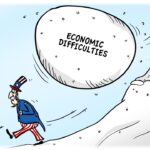“Whole-process people’s democracy” has been officially written into the Communiqué of the Sixth Plenary Session of the 19th Central Committee of the Communist Party of China. At Friday’s press conference on the sixth plenum, the concept has been further clarified, which has garnered extensive attention from home and abroad.
Democracy is one of the important results of human society’s development. It is destined to form different gene combinations in different social environments and manifest itself in various forms, just like that of plants and flowers.
The US and the West have always regarded themselves as property owners and missionaries of democracy, as if they are issuing democratic licenses to the world, preaching to people of other countries about how to be democratic and judging who is democratic and who is not. But they are no longer able to carry on such moves.
China has risen. We hold high the banner of people-centered socialist democracy, and develop an efficient market economy based on China’s political system. We have rapidly improved livelihood and eliminated poverty, gaining remarkable and globally eye-catching economic and social achievements.
In this process, elements of democracy with Chinese characteristics have continued to develop and grow. Governments at various levels have been exploring how to make democracy truly effective in all areas. This has formed the goal-oriented democratic construction in which the people are masters of the country. From election to consultations, from policymaking to management and supervision, all have been carried out, upgraded and institutionalized under the promotion of China’s fundamental political system. As a result, people’s wishes and opinions can always be reported to governments at different levels rapidly. The Party’s leadership has ensured that national governance always responds to the demands of the broadest masses of people and can make the most reasonable plan based on the interests of all groups in the society. This will make people the country’s masters.
China has developed democracy, but avoided populist radicalism. Everyone has the right to share the fruits of national development but vicious conflicts have been prevented among different interests groups. Although people often express opinions on the internet, sometimes in a fierce manner, China’s social governance has generally maintained order. There are very few disruptions caused by partial or large-scale disorder.
The US and the West still regard their democracy as a hallmark. Their political systems have been seriously aging after hundreds of years. Powerful Western interest groups seek to obtain from and exploit their systems in radical ways regardless of the damage they would cause, which has made Western-style democracy full of drawbacks such as populism, political struggles, derailed people participation, and manipulated and misguided elections.
Western-style democracy is still able to have a say in the international public opinion arena. It’s because of the economic and social strength accumulated in history. Those countries are still the most developed ones, which has helped them conceal their ugliness and fool the world with their sophistries and cover-ups.
However, some Western elites are now a little bit panicked. They know the West is plagued by problematic politics and a sluggish economy. Meanwhile, they have seen the fast development of China. After the outbreak of COVID-19, China’s “people first” political ideology has quickly transformed to great achievements in fighting the epidemic. They worry that if this continues, the fundamental flaws in their narratives about democracy will be exposed, and the perception that their political systems are “bad” will spread throughout the world.
The US and some Western countries in recent years have frantically increased their attacks on China’s political system. Doing so is of no help to solve the decline of their own systems. The political dividends of Western-style democracy have already been seriously overdrawn. Now the shortcomings of Western-style democracy have been exposed and further fermented, which is consuming the competitiveness of those countries.
Those Western political elites want to eliminate the challenge of democratic diversity and change the competition rules in the globalization era by stifling China’s development. However, China is a super-scale market and a powerful country. It’s a dead end if they attempt to solve their own difficulties by changing China.
The Chinese and Western democratic systems could learn from each other and carry out sound competition. Unfortunately, some political elites in the US and West stubbornly seek to turn the two systems into antagonistic relations. Then they will have to bear the long-term consequences of their actions. China will develop faster than them in the long run. After passing a critical point -it’s doomed to appear in future – the US and West’s political confidence will be greatly shaken. Their unrealistic flattery of Western-style democracy will collapse.
The world is seeing active reflections and hot debates over democracy. Which kind of democracy is good is not defined by a war of words. The good democracy must effectively provide economic and social development with a steady stream of impetus and promote the well-being of the broad masses of people. Facts will be the best judge.
China is making great efforts to bring benefits to its people and contribute positively to building a community with a shared future for mankind. We are earnest explorers of a democratic system that fits our own conditions. Our efforts and success have received much attention and praises from a vast number of developing countries. We have expanded people’s political vision, and contributed important experiences.
Developing countries generally face pressure from the US and the West. Due to their size, many countries are unable to withstand the pressure to explore an independent democratic paradigm. China’s practice is in line with their interests, bringing the light of freedom to the world when it comes to the national choice of development path.
Global Times Editorial: Global Times


